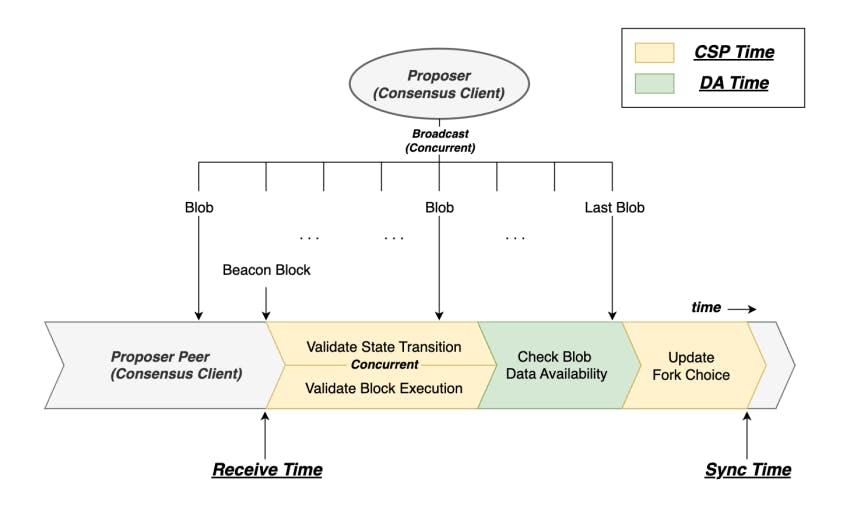Table of Links
Abstract and 1. Introduction
-
Background
2.1 Rollup
2.2 EIP-4844
2.3 VAR(Vector Autoregression)
-
Data
3.1 Consensus security data
3.2 Ethereum usage data
3.3 Rollup Transactions Data
3.4 Blob gas fee data
-
Empirical Results
4.1 Consensus security
4.2 Ethereum usage
4.3 Rollup transactions
4.4 Blob gas fee market
-
Conclusion and References
A. Consensus Security Data
B. Rollup Data Collection
C. Detailed Var Model Results for Blob Gas Base Fee and Gas Fee
D. Detailed Var Model Results for Blob Gas Base Fee and Blob Gas Priority Fee
E. Rollup Transaction Dynamics
2.2 EIP-4844
2.2.1 Data Availability in Rollups. Data availability(DA) ensures that specific data can be accessed at a given point in time and verified as accessible at that same point in the future. Unlike permanent data storage, DA does not imply indefinite data retention but ensures that data is temporarily accessible for verification and auditing purposes.
In the context of Ethereum rollups, DA is crucial for ensuring user security[44], with numerous researches focusing on enhancing this aspect[18, 25, 43]. It guarantees that users can access transaction data temporarily to verify state updates or reconstruct the rollup’s current state. For instance, in optimistic rollups, users require DA extending beyond the challenge period (typically 7-12 days) to validate state changes confidently.
The assurance of DA is vital because, without it, users must rely solely on the trustworthiness of rollup operators. This reliance can expose users to risks if operators act maliciously or withhold data, compromising the integrity of the rollup[20].
Prior to the implementation of EIP-4844, Ethereum rollups typically used Ethereum’s call-data—a space within transactions designated for storing function call arguments—for DA. This method involves storing compressed transaction data in calldata, where the cost is 16 gas per non-zero byte and 4 gas per zero byte[24]. EIP-4844 aims to refine this model by introducing more efficient data handling mechanisms to reduce costs and improve scalability, addressing both the economic and performance limitations of previous approaches.
2.2.2 Blob-carrying transaction. The Ethereum network has a current block gas limit of 30M gas, which theoretically allows for a maximum block size of 1.8MB when filled solely with calldata. This scenario represents a potential worst-case scenario for network block size. Further reducing the cost of calldata to enhance scalability risks permitting unsustainable block sizes, posing significant network overloading risks [8].
To mitigate these concerns and improve DA without significantly impacting the network’s maximum block size, EIP-4844, also known as Proto-DankSharding, introduces the concept of blob-carrying transactions. These transactions incorporate a new data structure called a blob, which consists of 4096 field elements, each 32 bytes in size, amounting to a total of 128KiB per blob. Rather than storing blobs directly within transactions, they are represented by a versioned hash of the blob’s KZG commitment hash and are temporarily maintained on the consensus layer for a duration of 18 days before deletion.
The design choice to exclude blobs from permanent storage on the execution layer significantly enhances gas efficiency. This is because blobs, unlike traditional calldata, do not incur the high gas costs associated with permanent data storage. The lifecycle of a blob, from creation to expiration, is illustrated in Figure 2.
2.3 VAR(Vector Autoregression)
VAR is a statistical model designed to analyze multivariate time series data[19]. It extends the univariate autoregressive model by allowing multiple interdependent time series to be modeled simultaneously. In a VAR model, each variable is a linear function of past lags of itself and past lags of other variables in the system. A VAR model of order 𝑝 (VAR(p)) is specified as follows:
Authors:
(1) Seongwan Park, this author contributed equally to the paper from Seoul National University, Seoul, Republic of Korea ([email protected]);
(2) Bosul Mun, this author contributed equally to the paper from Seoul National University, Seoul, Republic of Korea ([email protected]);
(3) Seungyun Lee, Seoul National University, Seoul, Repulic of Korea;
(4) Woojin Jeong, Seoul National University, Seoul, Repulic of Korea;
(5) Jaewook Lee, Seoul National University, Seoul, Repulic of Korea;
(6) Hyeonsang Eom, Seoul National University, Seoul, Repulic of Korea;
(7) Huisu Jang (Corresponding author), Soongsil University, Seoul, Republic of Korea.
This paper is














